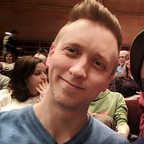Should I learn to code?
Let’s face it, coding has undergone a bit of an image shift in the last decade or so, and it’s gotten decidedly sexy. It’s gone from just being ‘something in computers’ (as a coder’s aged relatives might airily describe them) to something that increasingly raises eyebrows in interest. We hear more and more that children should to be taught to code from an early age, or that it’s an essential life skill on a par with learning to drive. We even hear that programmers are ushering in an age of widespread automation, and with it, mass leisure or redundancy (a premonition I personally find unlikely as it’s been promised since the dawn of the industrial revolution). One thing at least is clear: the tech industry is relentlessly expanding into an increasing number of aspects of our lives. Coding is here to stay.
Perhaps, like me, you’re new to coding, or wondering where or whether to start. Coding is something you can do for fun in your free time, or you might even be thinking of making a move into the industry as a whole. Before diving right in to the tech, here are a couple of signs that this might be something that plays to your strengths. Everyone’s experiences are different, of course, but speaking for myself, these are a couple of signs that coding could be as interesting and fulfilling for you as it is for me:
- Do you enjoy solving problems? This might not surprise you, but coders spend a lot of time trying to understand and fix things that don’t work. For some this might be frustrating or demoralising, but for my part, I get a real buzz from that ‘Ahah!’ moment when I iron out the last kink in a new bit of code so it finally. And even in the midst of the very worst of it you could be only moments away from everything clicking into place; more often than not it’s nothing more than just a misplaced bracket.
- Do you enjoy finding creative solutions? Coding really is a very creative endeavour at the end of the day. Just as in writing music, a thesis, or a play (all of which I’ve been lucky to do at various times), there are things that ‘work’ in a particular instance, or don’t, and the challenge is to come up with the one that best represents what you’re trying to achieve. You might have to have a number of repeated tries before you’re happy with the result (Does this work? No. Does this work? No. How about this? Ahah!) but you there’s a shot of instant gratification when you find the right piece of the jigsaw to slot into place.
- Are you a good communicator? Perhaps you have a stereotyped image of computer developers with poor social skills hunched over keyboards, oblivious to the world around them. In fact, this image couldn’t be further from the truth. Programming is a very social activity, and interpersonal skills are especially sought-after in the industry. Rather than being locked away on your own, as a developer you might spend a large proportion of your time pair-programming, and you’ll always be working in teams to bring features to light and ensure you’re all working on the same page. Outside of work too, there’s a huge community based around events and meet-ups that are very welcoming to outsiders, so feel free to turn up for yourself!
If the above makes coding sound appealing, then my advice would be to start with the Codeacademy Ruby course. Ruby is a very beginner-friendly language, one which was constructed with developers in mind to make their lives easier, and Codeacademy will ease you in with the very basics and set you some simple challenges. Perhaps, like me, you’ll be bitten with the bug and won’t look back.
